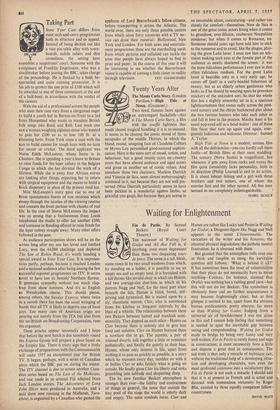Waiting for Enlightenment
Fin de Partie. By Samuel
THE successor of Waiting for Godpt and All that Fall is, if anything, even more depressant than those two despairing tours de force. The scene is a tall, bleak, stone room lit by two small windows from which, by standing on a ladder, it is possible to see an empty sea and an empty land. It is furnished with a tall throne-like invalid chair in which sits Hamm, and two average-size dust-bins in which sit his parents Nagg and Nell, for the most part silent beneath the lids. Hamm is blind, bored, self- pitying and tyrannical. He is waited upon by a sly, rheumatic moron, Cloy, who is summoned from his kitchen at frequent intervals by the blast of a whistle. The relationship between these two flickers between hatred and mawkish senti- mentality. They depend on each other—Hamm on Cloy because there is nobody else to give him food and sedative. Cloy on Hamm because there is nowhere else to go. The parents, a pair of wizened dwarfs, talk together a little or reminisce pathetically, and finally die quietly in their bins. Hamm, whose only interest in life, apart from wishing it to pass as quickly as possible, is a story which he recounts every day, rambles on with it or bullies Cloy or asks futilely what is going on outside. He finally gives Cloy his liberty and sinks grumbling into solitude and despairing sleep.
The by now familiar Beckett atmosphere is stronger than ever—the futility and contrariness of things in general, the sense that outside the - tiny pool of the stage the world is utterly dark and empty. The same symbols recur. Cloy and
Hamm are rather like Lucky and Pozzo in Waiting for Godot; a Diogenes-figure like Nagg and Nell appears in the novel L'Innommahle. The caricature of the writer and his histoires; the abysmal physical degradation; the pathetic mental frustration; he is obsessed with them.
But granted that the atmosphere rolls over, one as thick and tangible as smog, the inevitable question still follows : 'What is behind it all?' It has sometimes been the tenet of existentialists that their plays do not necessarily have to mean anything—Cocteau, for instance, claimed that Orphie was nothing but a rattling good yarn—but this will not do for Beckett. The symbolism 'is obviously there and on further acquaintance it may become frighteningly clear; but at first glimpse it seemed to me, apart from the obvious human predicaments, pretty obscure, far more so than Waiting for Godot. Judging from a universal air of bewilderment I was not alone in this and I cannot help feeling that something is needed to span the inevitable gap between seeing and comprehending. Waiting for Godot made its bridge by being very funny and very well written. Fin de Partie is rarely funny and sags in construction; it must necessarily bore a little and depress a great deal in consequence. The sad truth is that only a miracle of technique can, without the traditional help of a developing situa- tion and developing characters, turn even the most profound statement into a satisfactory play; Fin de hulk is not such a miracle. I should add that it is at present in French and is acted and directed with tremendous virtuosity by Roger Blin, assisted by three equally competent fellow- countrymen.
DAVID WATT












































 Previous page
Previous page